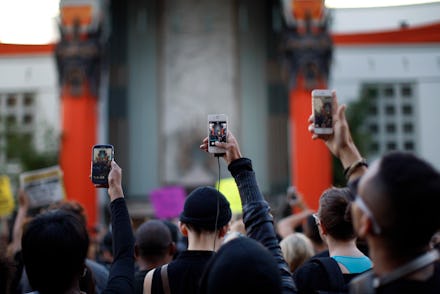Study Shows People in Disadvantaged Groups Use Social Media the Way Everyone Should

Facebook and Instagram can feel like a spiritual drain where we watch the same people we've always known perform the positivity of their life experiences — the same faces, same names, same babies, same relationships. If you relate to that, there's a pretty good chance you're white.
But for minorities and marginalized groups, social media is more often a place to diversify your network, find people who are unlike yourself and seek new connections, according to a study from Indiana University.
Because minorities and those without a college education have reduced access to opportunities and privileges in the U.S., the Internet becomes a space to seize that power and become more upwardly mobile.
The study asked people to log their social media interactions over a period of six days and found that for African Americans and Latinos — who are more dependent on mobile Internet than broadband connections —social media was a more reliable place to seek diversity and new, more valuable relationships.
Seizing social capital: Because minorities and those without a college education have reduced access to opportunities and privileges in the U.S., the Internet becomes a space to seize that power and become more upwardly mobile. This research explores the concept of social capital, or the tangible spoils of having diverse social relationships — job opportunities, recommendations, opportunities for professional advancement, etc. The paper highlights two kinds of social capital:
Bridging social capital unifies groups "across diverse social cleavages" which enables "linkage to external assets and information diffusion." A diverse social network likely includes more bridging social capital, including relationships with others of dissimilar demographic status (e.g., race, education, age, etc.).
"My article highlights the fact that the Internet can be an important tool for increasing social capital for marginalized groups who otherwise have limited opportunities for personal and professional networking, and underscores the need for making sure these groups have stable, high-quality Internet access," assistant professor Amy L. Gonzales, who wrote the paper, told Indiana University.
Gonzales is testing the idea of "social diversification hypothesis," a concept from the work of Israeli researcher Gustavo S. Mesch, which says that disadvantaged groups and minorities "will use the Internet to expand their social circle and overcome existing physical and social barriers to information and association." Conversely, this explains why white people in America are more insular on social media, keeping to their established friends and networks.
"The advantage of the majority group is in their access to educational and job resources, which they have much to gain in keeping their existing ties," Mesch writes.
In other words, white people and the college educated aren't breaking out of their social boundaries as much because they have more to gain by just sticking with the well-established networks that, like walled gardens and white picket fences, maintain an incubator of privilege and status.